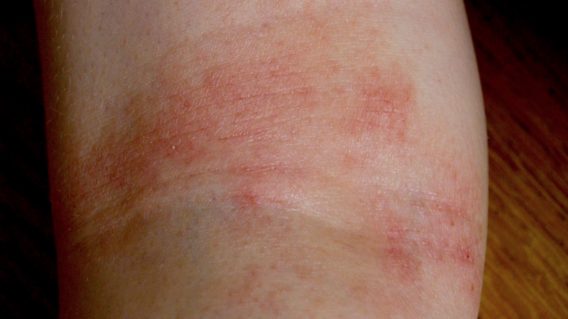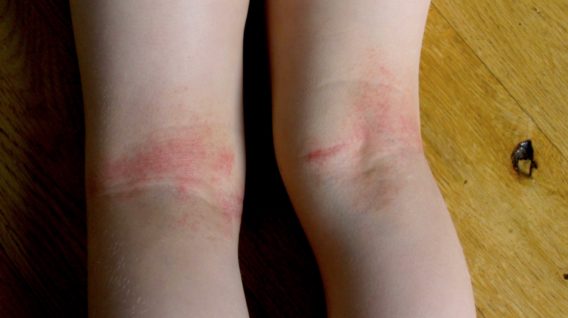Itchy, sore, red rashes anywhere on the body can be upsetting and distressing for your child.
Genes and family history of allergies and eczema
Aptopic eczema usually occurs when there’s a family history of allergies such as eczema, asthma or hayfever, and it affects around 20%of children. If you have a family history of eczema and allergies, it can help to protect your child from eczema by exclusive breastfeeding in babyhood for the first six months.
Childhood eczema can be quite difficult to treat. It usually starts in the early months of babyhood, but the good news is that usually children grow out of it.
What are the symptoms of eczema?
The symptoms include:
- In white children, patches of red, dry and itchy skin on the face or behind the ears or in the creases of the neck, knees, and elbows.
- In Asian and black children, eczema may not effect creases but may affect other areas.
- Aptopic eczema can lead to open ‘sores’ on the skin which leaves the skin more vulnerable to infection from bacteria, viruses, and fungus. If your child suffers a secondary infection of their eczema patches, their doctor will prescribe appropriate treatment.
How do I stop my child scratching?
If your child scratches their eczema (and he probably will), it can become infected and worsen quickly. So it’s important to treat it quickly.
If the problem is severe, you can try mitts at nighttime to stop him from scratching – but he may well pull them off. You can make sure at least that his nails are cut short and kept clean.

How do I treat my child’s eczema?
- Do not bath in hot water. Heat increases the itch. Only warm or cool.
- Avoid bubble baths and soap which is drying to the skin. Use a soap substitute instead (you can get these prescribed from your doctor).
- Avoid perfumed any products on the skin.
- Apply emollients frequently and liberally – don’t rub the cream in circles or up and down – just use gentle downwards strokes.
- Immediately after bathing apply non-fragranced emollient as this will help trap the water under it and thereby aid re-hydration. Take the emollient out of the pot with a clean spoon each time rather than using your fingers, to avoid contaminating the cream.
- Use a bath mat as emollients can make the bath slippery.
- Wash clothes just in water, or in the minimum effective quantity of non-biological, un-perfumed washing powder. If you do use powder, give clothes an extra rinse. Avoid fabric conditioners.
- Wear cotton (100%organic if possible as these garments will not have pesticide residues on them) or natural silk next to the skin. Wool and man-made fibres can irritate the skin. Use cotton sheets and duvet covers in beds.
- Keep bedrooms cool – overheating makes eczema worse. Warm, moist environments also encourage house dust mites. That said, eczema can also flair up in cold conditions which can dry the skin so try to keep the ambient environment not too cold or hot. Around 18 degrees is good for bedrooms.
- Keep pets out of the bedroom – animal dander can make eczema worse. Regular damp dusting and vacuuming will help to keep the dust levels down.
- Steroid creams can stop eczema from getting worse (this can happen very quickly so act fast). These are safe so long as they are prescribed by your child’s doctor and you follow the instructions carefully. However, they should be spread thinly, used sparingly and stopped when the redness disappears. Do not use longer than prescribed or you risk thinning your child’s skin and creating longer-term issues.
- Some doctors recommend washing bath toys in the dishwasher to keep them clean. Wash soft toys in the washing machine.
- Some eczema sufferers report that some foods make their eczema worse and cut out certain foods from their diet – for example, dairy foods. Don’t make dietary changes to your child without talking to your GP first. Cutting out important foods such as milk, dairy products, wheat or eggs should be recommended by a medical professional and supervised.
- Cut out refined sugar. There’s no benefit to eating refined sugar, and it can often cause eczema to flare up.
- Some eczema sufferers report that their eczema improves if they swim fairly frequently at the public pool. The suggestion is that the chlorine in the water kills bacteria on the skin surface of some eczema sufferers. However, other people report it makes their eczema worse. This is because there are different types of eczema – some respond well to chlorine and others respond badly. If you do take your child to the public pool to swim, try to notice how their eczema is affected. If it improves, mention this to your child’s doctor, and keep going swimming. If it is exacerbated, stop swimming – or at least wash really thoroughly afterwards – and also mention to the doctor.
- A lot of research suggests that eczema might be tied up with allergies and asthma. Probiotics can help with all these conditions – so try these with your child to see if they help. They may take a while to show an improvement so be patient.
- Gut flora is a new and interesting area of research surrounding eczema, allergies, and asthma. Scientists believe there is a correlation between low gut flora and the incidence of allergies, asthma, and eczema. Ways to increase gut flora might include letting your kids play outside and get dirty. Antibiotics can also wipe out gut flora so try not to request these from your doctor unless necessary.
References and further reading
Negar Foolad, BA; Elizabeth A. Brezinski, BA; Elizabeth P. Chase, MD; April W. Armstrong, MD, MPH (2013) Effect of Nutrient Supplementation on Atopic Dermatitis in Children; A Systematic Review of Probiotics, Prebiotics, Formula, and Fatty Acids. JAMA Dermatol. 2013;149(3):350-355. doi:10.1001/jamadermatol.2013.1495.
DISCLAIMER
This article is for information only and should not be used for the diagnosis or treatment of medical conditions. Essential Parent has used all reasonable care in compiling the information from leading experts and institutions but makes no warranty as to its accuracy. Consult a doctor or other health care professional for diagnosis and treatment of medical conditions. For details
click here.

